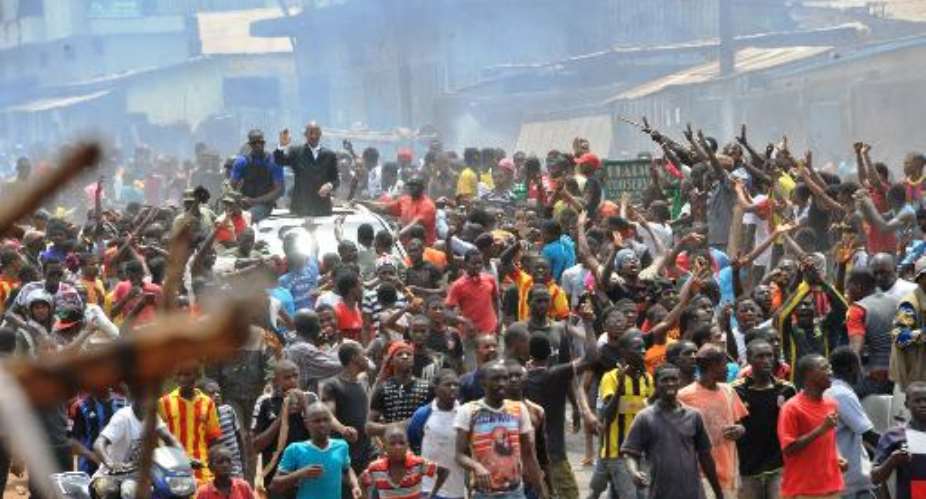Conakry (AFP) - Fresh violence erupted in the Guinean capital Tuesday after a day of clashes between police and anti-government protesters that left one dead and several with gunshot wounds, AFP correspondents witnessed.
Hundreds of youths hurled stones at police who responded with tear gas and warning shots, bringing traffic to a standstill on a main highway into the central Conakry.
At least five protesters were wounded, AFP correspondents witnessed, while eight others were arrested by security forces who had mobilised in large numbers to prevent opposition activists gathering for unauthorised rallies.
Former premier Cellou Dalein Diallo, now leader of the opposition, addressed the demonstrators from his car, shaking his fist and shouting: "I trust you -- the republican opposition trusts you and is relying on you."
Protesters marched alongside his vehicle for several kilometres (miles), chanting "Cellou for president" and "down with dictatorship, down with assassins, death to the killers".
The violence resumed after at least seven youths sustained gunshot wounds on Monday, according to the opposition, during demonstrations against a lack of stability it blames on the regime of President Alpha Conde.
The director of Conakry's Mother and Child clinic, Ibrahima Balde, told AFP one of those wounded later died.
The government has denied claims by the opposition and medical sources that the police had fired at protesters.
Ministers have warned however that "individuals currently engaged in acts of vandalism may in no circumstances be treated as peaceful activists".
Residents of the city's Hamdallaye suburb -- where at least three protesters were shot on Monday -- complained that police had raided their homes early on Tuesday.
After a night of relative calm, gunfire could be heard in the district of Cosa in the morning, an AFP reporter said, although it was not clear if they were intended to cause harm or were just warning shots.
- 'No legitimacy' -
Tuesday's clashes had initially been less intense than those of the previous day, but flared up after Diallo's appearance before his supporters, AFP correspondents said.
Shops remained shut across Conakry and the Marche Madina -- one of the largest markets in west Africa -- was closed.
The Department of Security and Civil Protection said Monday the head of the army had ordered troops to remain in their barracks, apparently to avoid exacerbating the unrest.
Guinea's opposition boycotted parliament in March in protest over the timetable for a presidential election.
It accused Conde -- who is in the United States for IMF/World Bank meetings -- of using the Ebola epidemic as an excuse to postpone voting.
Diallo, along with fellow former prime ministers Sidya Toure and Lansana Kouyate, accused Conde of repeated rights violations and said he had "lost all legitimacy".
They have called on supporters to back several demands, including a call to bring forward local elections due in March next year.
Guinea, one of the poorest countries in west Africa despite vast potential for mineral exploitation, was run by a succession of autocratic rulers for decades after gaining independence from France in 1958.
A military junta took control in 2008 after the death of president Lansana Conte, who seized power in a coup 24 years earlier.
A caretaker regime then oversaw the transition to civilian rule in 2010.
The last election -- September 2013's parliamentary vote -- was delayed by almost three years, stoking deadly ethnic tensions.





 S.Africa building collapse kills one, traps dozens: police
S.Africa building collapse kills one, traps dozens: police
 Election 2024: I’m ready to serve Ghana with my heart, energies – Bawumia
Election 2024: I’m ready to serve Ghana with my heart, energies – Bawumia
 We saved Ghana $19million in 2020 elections – EC
We saved Ghana $19million in 2020 elections – EC
 Nobody has ever enticed me with money to rule in his or her favour — Otumfuo
Nobody has ever enticed me with money to rule in his or her favour — Otumfuo
 Limited voter registration: Dumsor will not affect registration, we've rented ge...
Limited voter registration: Dumsor will not affect registration, we've rented ge...
 Back Free SHS policy with legislative instrument to prevent successive govt from...
Back Free SHS policy with legislative instrument to prevent successive govt from...
 Dadieso LPG tanker accident: No live or property lost as speculated, product suc...
Dadieso LPG tanker accident: No live or property lost as speculated, product suc...
 EOCO to return docket on Cecilia Abena Dapaah to OSP over lack of evidence
EOCO to return docket on Cecilia Abena Dapaah to OSP over lack of evidence
 Police, youth clash at Dambai; teenager killed by stray bullet
Police, youth clash at Dambai; teenager killed by stray bullet
 Court convicts student for issuing GHC50,000 dud cheque
Court convicts student for issuing GHC50,000 dud cheque
